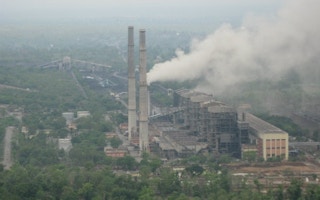India must revamp current laws on the environment, land, labour and finance to enable a “just de-commissioning” of coal-based power plants and related industries, and to ensure a just rehabilitation of their workers and infrastructure, experts said at a conference in New Delhi on 12 October.
Across India, more than 50,000 megawatts (MW) of coal-based capacity is expected to be retired by 2030 due to techno-economic reasons, a report released at the event said, but little guidance exists on their end-of-life management.
Until a few years ago, India’s old power plants were replaced with more efficient newer ones. This is changing, as decarbonisation efforts pick up pace and clean energy generation gets prioritised to enable India to reach its target of net-zero emissions by 2070.
This industrial decommissioning has environmental, labour, land and financial implications, but existing laws in those domains are inadequate to make this process fair and sustainable, the experts said, calling for time-bound clean-up and remediation of the site and land as well as compensation and social security for the workers.
The report estimates that some 850,000 to 970,000 workers – formal and informal – are currently employed in the thermal power sector. As power plants aged 25 years are gradually closed, some 192,028 workers would lose their jobs by 2030. The next decade of the 2030s will see steeper job losses, of 398,215 workers, and beyond 2040, another 247,892 workers.
“A just transition means that the plant site is fully remediated, the workforce is compensated or reemployed, the economic loss of dependent communities is compensated, and new economic opportunities and environmental outcomes are created for communities to benefit from,” said Chandra Bhushan, president and chief executive of the International Forum for Environment, Sustainability and Technology (iFOREST), which organised the webinar and published the report.
“However, our current laws do not ensure a just transition. It is, therefore, important to modify our existing laws or enact a new law to ensure a just transition for the environment, labour and communities”, he said.
Where things stand
India’s power ministry has advised that coal-based power plants older than 25 years should be closed as part of the country’s decarbonisation plans. This amounts to 50,000-60,000 MW capacity retiring within the next eight years, Chandra Bhushan said, adding: “Therefore, it is important to ask if the country is prepared to decommission such large capacities and ensure a just outcome for the environment, labour and dependent communities.”
“There are no laws that can force a plant owner to dismantle the plant, clean up the site and set up a new facility. Unlike the mining sector, power plants and industries are not required to prepare decommissioning plans,” said Mandvi Singh, programme lead, iFOREST and the lead writer of the report, titled ‘Just Transition of coal-based power plants in India: A policy and regulatory review’.
What can be done
The report’s key findings and recommendations include:
Environment: Current environmental statutes, such as the Environmental Impact Assessment Notification of 2006 and the Water (Prevention and Control of Pollution) Act, are silent on decommissioning. These must be modified to require and guide decommissioning.
Land: The land acquisition laws through which land for power plants was acquired contain no provisions on the return of the land or its remediation and redevelopment after the decommissioning of the power plant. Guidance and formal mechanisms are needed at the central or state levels for repurposing and redeveloping such land.
Labour: Existing labour laws and upcoming Labour Codes do not deal with large-scale closure of industrial facilities. A legal framework that enables peaceful and systematic closure, including mechanisms for compensation and social security, is essential.
Financing: The value salvages from the sale of scraps is inadequate to pay for decommissioning or repurposing, experience from India and abroad shows. Repurposing must be made financially viable.
Central Pollution Control Board scientist Nazimuddin said the pollution regulator is in the process of finalising environmental guidelines on the closure of thermal power plants, which will be placed in the public domain for comment.
Engaging communities, protecting workers
D.V. Lakshmipathy, chief general manager at state-run thermal power company NTPC shared his experience from the closure of the Badarpur thermal power station in Delhi: “As the retirement of power plants is likely to increase in the future, clear guidance on financial aspects is needed. Financing is a concern as power purchase agreements do not have provisions for decommissioning costs. A clear directive from CERC [Central Electricity Regulatory Authority] in this context is needed.”
Namita Wahi, founding director, Land Rights Initiative and senior fellow, Centre for Policy Research, Delhi, said local communities must be part of all decisions. “It is important to engage the local community in the land repurposing decision, especially in context of forest land. They must be included in any formal mechanism developed for deciding on the fate of the decommissioned power plant land, because these lands were initially taken away from them.”
Subhagya Pradhan, general secretary at the Indian National Trade Union Congress in the state of Odisha, said informal and sub-contract workers are particularly vulnerable at the time of plant closures. Speaking of the 2021 decommissioning of the Talcher thermal power plant in Odisha, he said, “Contract workers and local businesses suffered the most… as they were left without any compensation and [alternative] opportunity. We need legal safeguards for informal workers.”
To continue reading, subscribe to Eco‑Business.
There's something for everyone. We offer a range of subscription plans.
- Access our stories and receive our Insights Weekly newsletter with the free EB Member plan.
- Unlock unlimited access to our content and archive with EB Circle.
- Publish your content with EB Premium.

















